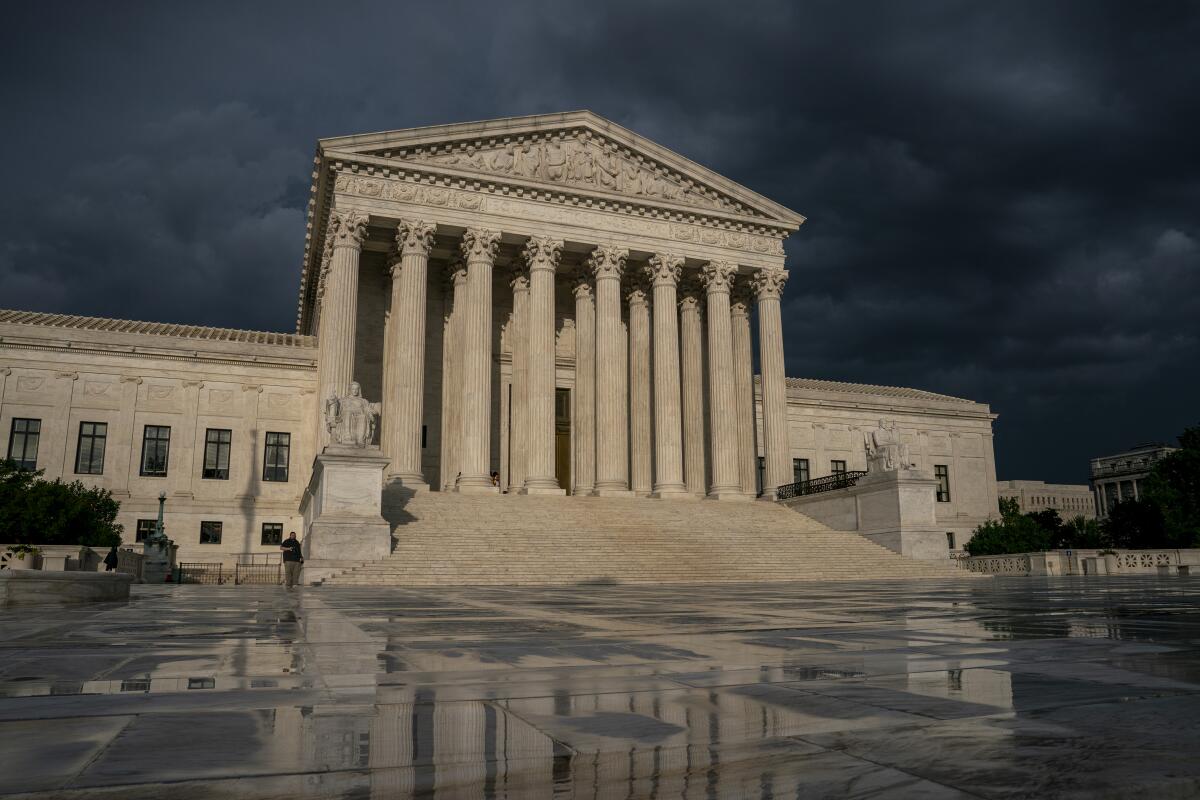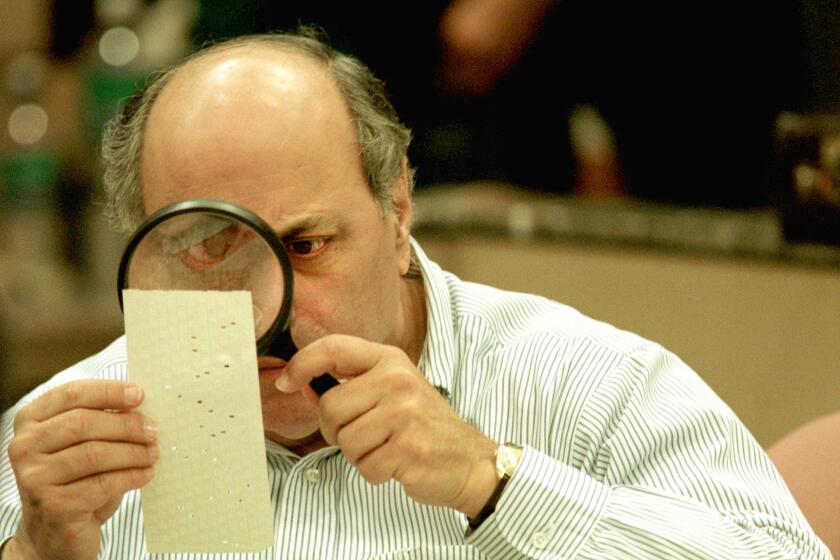Column: Why the Supreme Court is one of the biggest threats to American democracy

In the popular imagination, successful coups require the participation of the military. Carol Leonnig and Philip Rucker, in their latest book on the Trump presidency, “I Alone Can Fix It,” paint Gen. Mark A. Milley, chairman of the Joint Chiefs of Staff, in heroic colors. During the runup to the 2020 election, Milley, worried about a “Reichstag moment,” resolved with his colleagues to thwart whatever the former president might try.
The truth is, the biggest threat to American democracy isn’t a military coup, as Milley’s laudable behavior tends to show. The more probable danger is much less dramatic and much more terrifying: a horrible decision from the final arbiter of our constitutional system — the Supreme Court of the United States.
A constitutional theory is gaining ground at the court that could theoretically have awarded the 2020 election to Donald Trump, despite his having been swamped at the polls. Its basis is an obscure and muddled argument that first surfaced when the Supreme Court stepped into the George W. Bush-Al Gore 2000 presidential contest and stopped a state-court ordered recount in Florida.
Chief Justice William Rehnquist, straining to explain why the U.S. Supreme Court should meddle in the matter, seized on Article I, Section 4 and Article 2, Section 2 of the Constitution, which specify that state legislatures may establish rules for the “Manner” in which federal elections are conducted (unless Congress sets a contradictory national rule). In a separate opinion in Bush vs. Gore, joined by Antonin Scalia and Clarence Thomas, Rehnquist discerned from these provisions that “a significant departure from [a state] legislative scheme for appointing Presidential electors presents a federal constitutional question.”
In other words, if in the judgment of the Supreme Court, a state court decision about state election law seems to strain the state legislature’s intent, the federal high court can strike it down as a violation of the Constitution.
This is a wholly wild-eyed theory. Its chief flaw (there are others) is that it ignores the fact that the U.S. Supreme Court had neither the authority nor the expertise to pronounce a state court ruling a “significant departure” from a state legislative scheme. The Supreme Court interprets federal law, not state law. Anything else runs roughshod over core constitutional principles of federalism.
It also clears a path for making mischief with free and fair elections.
Rehnquist’s dubious theory has not yet commanded a majority of the court, but sad to say, it has struck the fancy of several justices. In the last two years, Thomas, Justice Brett Kavanaugh and Justice Samuel Alito have all cozied up to Rehnquist’s opinion in their own writings.
Thomas weighed in in February, in a case that challenged Joe Biden’s victory in Pennsylvania. The Supreme Court ultimately denied it a hearing, but Thomas penned a dissent.
With the pandemic raging before the 2020 election, the Pennsylvania Supreme Court had ruled, based on the state constitution, in favor of a three-day extension of the deadline for receiving mail-in ballots. Thomas argued that the added days represented a federal constitutional violation: The Pennsylvania justices had changed an election law, coopting the role the U.S. Constitution reserved for state legislatures.
If the court had agreed to hear the case and had Thomas’ view of the facts prevailed, the likely remedy would have been to toss the Pennsylvania election back to the state — and into the Legislature — for a do-over. At an extreme, the partisan Republicans that dominate the Pennsylvania Legislature might have tried to declare a new set of electors — for Trump, not Biden — and the voters be damned.
Justice Brett Kavanaugh’s shout-out to the discredited decision that muscled George W. Bush into the White House should be considered an early warning.
This is the kind of legal coup Trump conjured when he tweeted on the morning of Jan. 6, “All Mike Pence has to do is send them” — the election results — “back to the States, AND WE WIN.” It would also have been the endgame of the attempt by a Trump loyalist to strongarm the Department of Justice into disparaging the election results in Georgia.
A wave of lawsuits would have followed, and the Trump forces could have dressed up their treachery with the Rehnquist argument, potentially empowering state legislatures in the president’s thrall to defeat democratic rule.
It should be unthinkable that the Supreme Court would be party to such a cataclysmic outcome as overturning the clear will of voters on the basis of a lawless theory. As the aphorism goes, “The Constitution is not a suicide pact.” At the same time, it was beyond belief for many legal scholars that a bare conservative majority of the court would bulldoze the law in Bush vs. Gore, all but handing the White House to the GOP.
That notorious decision played out amid extreme partisan fervor on all sides. The passions that would accompany another election-law showdown in the Supreme Court — in, say, 2024 — could make the Florida frenzy look like a school board squabble. It’s conceivable that the partisan instincts of a majority of the court would again override their legal judgment about both constitutional provisions and the court’s proper role.
The bullet that American democracy dodged in 2020 was not boots in the street but jurisprudence in the Supreme Court. It remains a remote threat, but that’s still where a death-blow to the republic lies.
More to Read
A cure for the common opinion
Get thought-provoking perspectives with our weekly newsletter.
You may occasionally receive promotional content from the Los Angeles Times.












